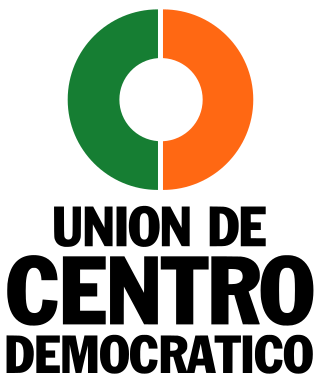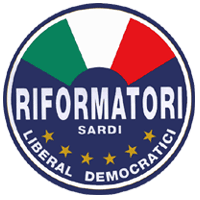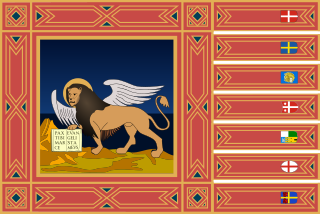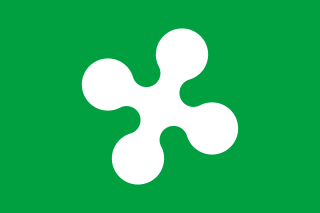 |
|---|
|
The Abruzzo regional election of 1980 took place on 8 June 1980.

 |
|---|
|
The Abruzzo regional election of 1980 took place on 8 June 1980.

Christian Democracy was by far the largest party, while the Italian Communist Party came distantly second.
After the election Romeo Ricciuti, the incumbent Christian Democratic President, formed a new regional government, but as soon as in 1981, he was replaced by Anna Nenna D'Antonio and later, since 1983, by Felice Spadaccini.
 | ||||
|---|---|---|---|---|
| Parties | votes | votes (%) | seats | |
| Christian Democracy | 355,246 | 45.8 | 20 | |
| Italian Communist Party | 213,823 | 27.6 | 12 | |
| Italian Socialist Party | 84,132 | 10.8 | 4 | |
| Italian Social Movement | 45,669 | 5.9 | 2 | |
| Italian Democratic Socialist Party | 35,605 | 4.6 | 1 | |
| Italian Republican Party | 18,976 | 2.4 | 1 | |
| Italian Liberal Party | 11,496 | 1.5 | - | |
| Proletarian Unity Party | 9,916 | 1.3 | - | |
| Progressive Party of Abruzzo | 1,256 | 0.2 | - | |
| Total | 776,119 | 100.0 | 40 | |
Source: Ministry of the Interior [ permanent dead link ]

The Christian Social Union in Bavaria is a Christian democratic and conservative political party in Germany. Having a regionalist identity, the CSU operates only in Bavaria while its larger counterpart, the Christian Democratic Union (CDU), operates in the other fifteen states of Germany. It differs from the CDU by being somewhat more conservative in social matters, following Catholic social teaching. The CSU is considered the de facto successor of the Weimar-era Catholic Bavarian People's Party.

The People's Party is a conservative and Christian-democratic political party in Spain.

Alojz "Lojze" Peterle is a Slovenian politician. He is a member of New Slovenia, part of the European People's Party. He served as Prime Minister of Slovenia from 1990 to 1992, Leader of the Christian Democrats from the founding of the party in 1990 until it merged with the Slovenian People's Party in 2000, and was Minister of Foreign Affairs from 1993 to 1994 and again in 2000. He was a Member of the National Assembly from 1996 to 2004, and a Member of the European Parliament from 2004 to 2019.

The Union of the Democratic Centre was an electoral alliance, and later political party, in Spain, existing from 1977 to 1983. It was initially led by Adolfo Suárez.

The Sardinian Action Party is a Sardinian nationalist, regionalist and separatist political party in Sardinia. While being traditionally part of the Sardinian centre-left, the party has also sided with the centre-right coalition and, more recently, with the League.

The People's Alliance was a post-Francoist electoral coalition, and later a conservative political party in Spain, founded in 1976 as a federation of political associations. Transformed into a party in 1977 and led by Manuel Fraga, it became the main conservative right-wing party in Spain. It was refounded as the People's Party in 1989.
Roland Gewalt is a German politician who served as a Member of the European Parliament from 2005 until 2009. He has been a member of the Christian Democratic Union of Germany since 1980, which is affiliated with the Group of the European People's Party and European Democrats in the European Parliament. During his time in parliament, he was a member of the Committee on Transport and Tourism and the delegation for relations with South Africa. He was also a substitute for the Committee on Legal Affairs and the delegation to the ACP-EU Joint Parliamentary Assembly.

The 1983 Italian general election was held in Italy on 26 June 1983. The Pentaparty formula, the governative alliance between five centrist parties, caused unexpected problems to Christian Democracy. The alliance was fixed and universal, extended both to the national government and to the local administrations. Considering that the election result did no longer depend on the strength of the DC, but the strength of the entire Pentapartito, centrist electors began to look at the Christian Democratic vote as not necessary to prevent a Communist success. Moreover, voting for one of the four minor parties of the alliance was seen as a form of moderate protest against the government without giving advantages to the PCI. Other minor effects of this election were a reduction of the referendarian Radical Party and the appearance of some regional forces.

The Sardinian Reformers is a liberal-conservative and regionalist, Christian-democratic political party in Sardinia, led by Michele Cossa. The party, which has always been part of the centre-right at the Sardinian regional level, is a keen supporter of the free market, competition, globalization and a two-party system.

This page gathers the results of elections in Veneto.

The Venetian regional election of 1975 took place on 15 June 1975. Ten new seats were added to the Regional Council following the 1971 census.

The Venetian regional election of 1980 took place on 8 June 1980.

The Slovene Union is a political party in Italy representing the Slovene minority in the Friuli-Venezia Giulia region. Its Slovenian language name means literally "Slovene Community", but the denomination "Slovene Union" is used in other languages.

The politics of Lombardy, a region of Italy, takes place in a framework of a semi-presidential representative democracy, whereby the President of the Region is the head of government, and of a pluriform multi-party system. Legislative power is vested in the Regional Council of Lombardy, while executive power is exercised by the Regional Government led by the President, who is directly elected by the people. The current Statute, which regulates the functioning of the regional institutions, has been in force since 2008.

The 1980 Lombard regional election took place on 8 June 1980. The 3rd term of the Regional Council was chosen.

The 1980 Piedmontese regional election took place on 8 June 1980.

The Sardinian regional election of 1979 took place on 17 June 1979.

The Italian regional elections of 1980 were held on 8 and 9 June. The fifteen ordinary regions, created in 1970, elected their third assemblies.

Marco Buschmann is a German lawyer and politician of the Free Democratic Party (FDP) who has been serving as Federal Minister of Justice in Chancellor Olaf Scholz's cabinet since 2021. He has served as a member of the Bundestag from the state of North Rhine-Westphalia from 2009 to 2013 and again since 2017.